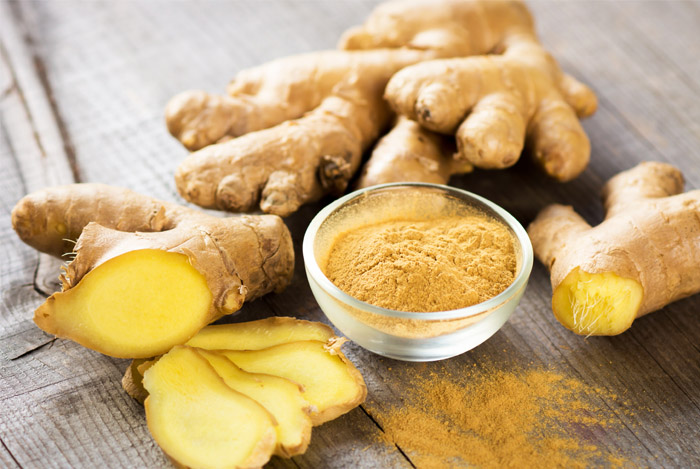
Ginger, a gnarled root with a distinctive hot pungent flavour, is among the most widely used and best studied of kitchen cures. Closely related to the spices turmeric and cardamom, ginger has been used medicinally and as a seasoning for at least 5,000 years. It is renowned worldwide for its ability to alleviate nausea, vomiting, morning sickness and other digestive complaints – conditions that aren’t always helped by modern drugs. And in the last few decades, the potential uses for ginger have extended far beyond the gut.
What’s it good for?
- arthritis
- bursitis and tendinitis
- cold and flu
- coughs
- headache
- heartburn
- high cholesterol
- hives
- indigestion
- irritable bowel syndrome
- itching
- menstrual problems
- migraines
- morning sickness
- nausea
- peptic ulcers
- toothache
- wind, bloating and flatulence
Whether you have an upset stomach or feel shivery and have a cold, ginger can help. You can take it as a tea, a capsule or crystallized in sugar. Or you can add it to food or simply munch gingernuts. Many healing herbs have to be taken in huge amounts to provide health benefits. Ginger is different because the amount you’d add to a curry or stir-fry can easily match or exceed the amount used in supplements.
Stomach soother
Ginger is among the most potent remedies for motion sickness as well as common-or-garden tummy upsets. In fact, some studies have shown that it works just as well as certain nausea-stopping drugs. In one famous piece of research, scientists strapped volunteers in rotating chairs and took them for a ride. Those given a pharmaceuticals anti-nausea medication lasted only about 41/2 minutes before begging to stop. Half of the people given ginger, on the other hand, lasted 6 minutes, with less nausea than the medicated group.
The chemical compounds that give ginger its zesty taste – mainly gingerol and shogaol – appear to reduce intestinal contractions, neutralize digestive acids and inhibit the ’vomiting centre’ in the brain. Doctors often recommended ginger to prevent nausea because it doesn’t cause drowsiness the way anti-nausea drugs can. It has even been used to lesson chemotherapy-included nausea and post-operative nausea.
Ginger is much better at preventing nausea than stopping it. If you’re susceptible to motion sickness, for instance, the time to take ginger is before you to get in the car or board a cross-channel ferry. Take about a ¼ teaspoon of powder ginger, 1g of ginger in capsule form or a 1cm slice of fresh root ginger at least 20 minutes before leaving.
Whole body protection
Ginger is most popular for nausea and stomach upsets, but there is evidence of many other benefits. For example, it can:
* Short-circuit migraines Danish researcher report that a 1/3 teaspoon of fresh or powdered ginger, taken at the first sign of migraine, may reduce symptoms by blocking prostaglandins, chemicals that cause inflammation in blood vessels in the brain. Unlike aspirin and related drugs, ginger blocks only the types of prostaglandins that cause inflammation, not the ones that have beneficial roles, such as strengthening the stomach lining.
* Ease arthritis pain The same prostaglandins that contribute to migraine pain also cause joint swelling in people with rheumatoid arthritis or osteoarthritis. A study of 56 people found that ginger eased symptoms in 55 per cent of people with osteoarthritis and 74 per cent of those with rheumatoid arthritis. Repeatedly applying crushed root ginger to the skin may provide additional relief by depleting stores of substance P.a. neurotransmitter that carries pain signals to the spinal cord and, ultimately, the brain.
* Reduce blood clots Doctors often advise patients to take aspirin every other day because it ‘thins’ the blood by interfering with the action of platelets, cell-like structures that cause blood clots and increase the risk of heart attack. Ginger has similar effects but without the stomach upset often caused by aspirin (unless, of course, your stomach is sensitive to ginger or you eat too much of it).
* Take the stuffiness out of colds Ginger can block the body’s production of substances that contribute to bronchial construction, as well as fever. The gingerols in ginger also act as natural cough suppressants.
* Lower cholesterol Laboratory studies suggest that ginger reduces the absorption of cholesterol by the body and also promotes its excretion.
* Relieve menstrual pain Chemical compounds in ginger act as antispasmodics. They inhibit painful contractions of the uterus, as well as the smooth muscles of the digestive tract.
Ginger’s many guises
The active ingredients in ginger retain their potency when they’re processed into almost any form. Many people prefer ginger capsules because they’re easy to take and provide a concentrated (and predictable) source of ginger’s chemical compounds. The usual dose is 100 to 200mg, three times a day.
Here are healing amounts of other forms of ginger:
* A 1cm (1/2in) slice of root ginger. Grating the ginger will release more of the active ingredients than slicing or chopping. It is also important to buy ginger when it’s fresh. Avoid root ginger that has soft spots or mouldy, wrinkled skin.
* 1 teaspoon of powdered ginger.
* 1 or 2 pieces of crystalized ginger.
* 1 cup of ginger tea, made with a ginger tea bag or half a teaspoon of grated root ginger. Steep in a cup of hot water.
* A 350ml (12fl oz) glass of natural ginger beer. But check the label to make sure it contains real ginger, not simply ginger flavouring.
Cautions and Side Effects
If you are pregnant, or have a peptic ulcer or gallstones, ask your doctor before using ginger. Avoid high doses if you are taking anticoagulant medication.